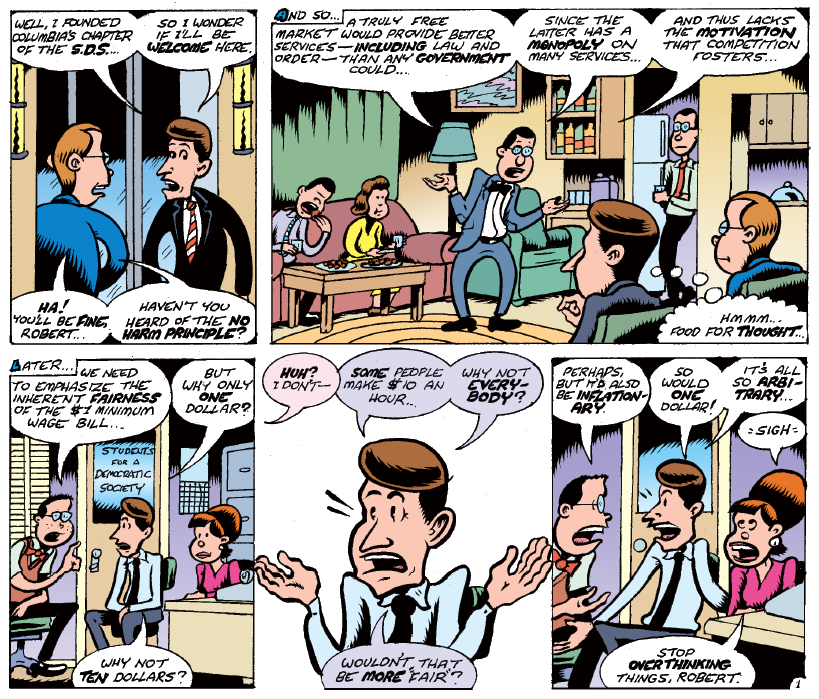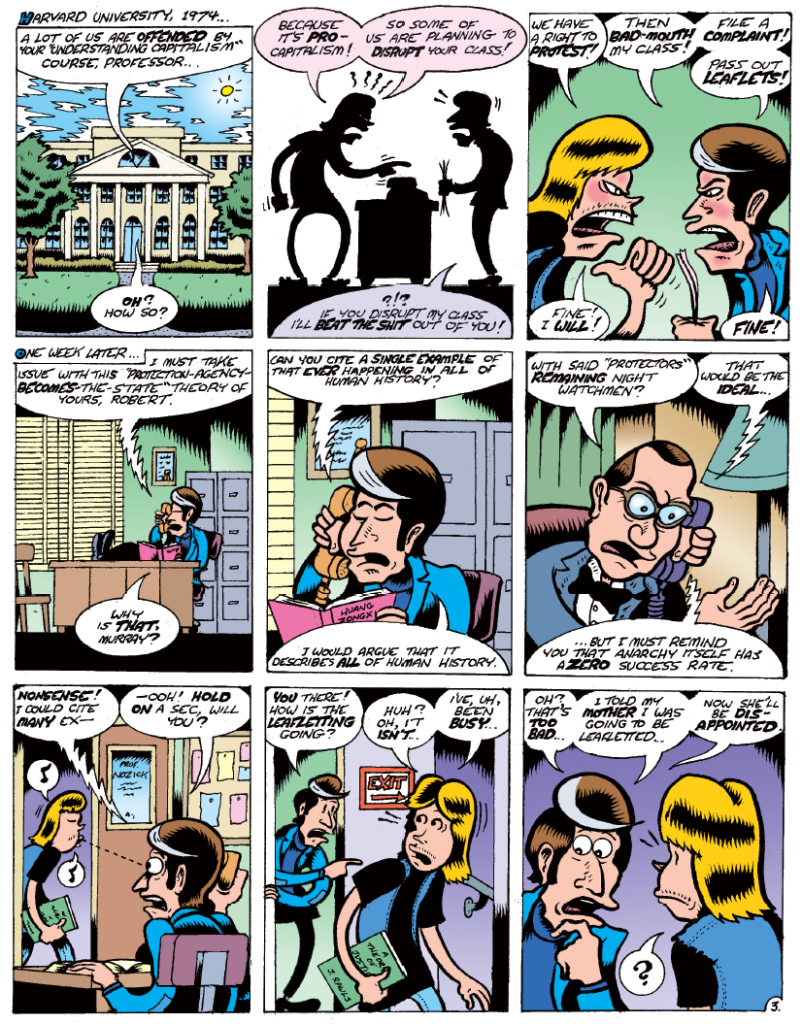



The post Comic: The Ever-Evolving Robert Nozick appeared first on Reason.com.
from Latest https://ift.tt/5dgiWbn
via IFTTT
another site




The post Comic: The Ever-Evolving Robert Nozick appeared first on Reason.com.
from Latest https://ift.tt/5dgiWbn
via IFTTT

A jury has found former Puerto Rico House of Representatives member María Milagros “Tata” Charbonier and her husband Orlando Montes-Rivera guilty of conspiracy, theft, bribery, kickbacks concerning programs receiving federal funds, wire fraud, and money laundering. While in office, Charbonier increased the pay of her assistant, Frances Acevedo-Ceballos, from $800 to between $2,100 and $2,900 in each biweekly paycheck. But the assistant kicked back between $1,000 and $1,500 of each paycheck to Charbonier, her husband, and their son.
The post Brickbat: Kick It Back appeared first on Reason.com.
from Latest https://ift.tt/IbmutEn
via IFTTT
There is quite a bit of hyperbole about immigration policy and the southern border these days. To take one prominent example, Texas Governor Greg Abbott suggests there is an “invasion” of illegal immigrants that justifies state action under the Constitution. As a constitutional matter, this is not true.
It is not just politicians who are engaged in false, hyperbolic statements, however. Journalists and purported experts are doing it too, such as those who claim that Texas is “defying” the Supreme Court by continuing to put up c-wire on state and private land near the border with Mexico. According to these accounts, because the Supreme Court lifted an injunction that barred the federal government from removing c-wire where necessary for immigration enforcement activities, Texas is flouting the Supreme Court by continuing to place c-wire on state and private property. This is not true either.
In the relevant case, Department of Homeland Security v. Texas, Texas is suing the federal government, in tort, for the destruction of state property (c-wire barriers and the like). The district court generally concluded that Texas was right on the facts, but wrong on the law, because Texas could not seek money damages from the federal government due to sovereign immunity. The U.S. Court of Appeals for the Fifth Circuit enjoined the federal government from taking additional actions that remove or destroy c-wire barriers on state and private land, save where such actions were necessary to address a medical emergency, pending additional proceedings. Among other things, the Fifth Circuit concluded Texas would be likely to show the federal government had waived its sovereign immunity under 5 U.S.C. Section 702.
All the Supreme Court did (in this order) is eliminate this injunction—likely because it concluded that the federal government is likely to prevail on sovereign immunity grounds. It did not rule on—indeed, it was not called to rule upon—the lawfulness of anything Texas is doing. Nothing in what the Supreme Court did told Texas to take or refrain from any action.
But don’t just take my word for it. Here is what Professor Steve Vladeck (no fan of the Abbott administration) wrote in his “One First” substack newsletter:
perhaps the most important thing to say about the order is how little it actually resolved (someone really ought to write a book about why this is a bad thing): By vacating the Fifth Circuit’s injunction, the Court effectively protected the federal government from contempt sanctions if it continues to remove the razor wire that Texas has placed along the border—and nothing more. Thus, nothing Texas did or said later in the week was “defying” the Court’s ruling; much like President Jefferson and Marbury v. Madison, there was no real way Abbott could defy such a modest ruling because it wasn’t directed at Texas in the first place. Instead, as explained in more detail below, the real legal disputes between Texas and the federal government at the border remain very much open and unsettled (and are likely to only escalate further, given the politics of the moment).
As Vladeck notes, there are other pending cases that challenge the lawfulness of actions Texas has taken that conflict with the Biden Administration’s immigration policy enforcement choices. One of these cases challenges a new immigration law in Texas that looks highly suspect under Arizona v. United States, a 5-4 decision from 2012 in which the Court concluded that many state actions to enforce federal immigration laws are preempted. If courts rule against Texas in those cases–and I suspect they might–and Texas does not stand down, then it will be appropriate to call out the Lone Star state for defying the Supreme Court. But that is not what has happened yet, and it is irresponsible for journalists and others who should know better to say so.
Governor Abbott may be reckless and cavalier, particularly with his rhetoric, but he’s no Judge Aiken (at least not yet).
The post No, Texas Has Not "Defied" The Supreme Court appeared first on Reason.com.
from Latest https://ift.tt/QugSj9Z
via IFTTT
From today’s nonprecedential decision in John Doe P v. Zink:
After the trial court allowed the plaintiffs to litigate in pseudonym, it directed them to file a sealed document containing their actual names (Disclosure Document)…. We hold that the record does not support the trial court’s finding that continued sealing was justified by compelling privacy or safety concerns that outweighed the public interest in access to court records….
In 2014, Zink sent a Public Records Act (PRA) request to Thurston County seeking various sex offender records, including registration records, special sex offender sentencing alternative (SSOSA) evaluations, and special sex offender disposition alternative (SSODA) evaluations. John Doe P, John Doe Q, John Doe R, and John Doe S (collectively Does) sued to enjoin the county from releasing the records. John Does P, Q, and S are level I sex offenders {those classified as the least likely to reoffend} who alleged they complied with registration requirements. John Doe R alleged he was convicted of a sex offense in juvenile court, had completed treatment, and had been relieved of the duty to register. The Does alleged that releasing the records Zink requested would cause irreparable harm because they would reveal the identity of sex offenders, like themselves, who were not statutorily required to be listed on the state’s publicly available website.
Zink eventually largely prevailed on the substantive Public Records Act claims, after several different decisions of appellate courts and the state supreme court (including John Doe A and John Doe P II). And in this decision, she also prevailed in her argument that the documents in which Does identified themselves to the court needed to be made public:
“In determining whether court records may be sealed from public disclosure, we start with the presumption of openness.” While “[o]penness is presumptive, … it is not absolute.” GR 15 sets forth generally applicable standards for sealing and redacting court records. Under GR 15(c)(2), a court can seal or redact a record only if “the court makes and enters written findings that the specific sealing or redaction is justified by identified compelling privacy or safety concerns that outweigh the public interest in access to the court record.” …
Here, the trial court’s 2021 findings state, in relevant part:
The [Does] … established compelling privacy and safety concerns and a serious imminent threat of numerous forms of harm if their names are revealed, through their motion and … declarations …, that sufficiently outweigh the public interest and [Zink’s] interest[ ] in the disclosure of the [Does]’ identities.
But the record reflects that by 2019, after our Supreme Court held in John Doe A that sex offender registration records are not exempt from PRA disclosure, Zink was receiving yearly updates of a Washington State Patrol database identifying all level I sex offenders registered in Thurston County, including juvenile offenders. It is undisputed that Zink made the database available online and shared it with others who requested it. She also filed a part of the database below in response to the Does’ 2019 motion to remain under pseudonym. Meanwhile, this court held that most of the records Zink requested from Thurston County had to be disclosed. It is also undisputed that after John Doe P II, Thurston County began releasing the records that Zink was entitled to, including registration records identifying level I sex offenders.
In short, the information the Does sought to protect by filing their lawsuit— their identities as sex offenders—became publicly available well before their September 2022 motion to keep the Disclosure Document sealed. So, to support a finding that continued sealing of the Disclosure Document was justified by compelling privacy or safety concerns under GR 15(c)(2), the Does needed to identify privacy or safety concerns specific to their identities as the plaintiffs in this lawsuit, which is distinct from their identities as sex offenders.
The Does failed to identify such concerns. They filed most of their supporting declarations before our Supreme Court’s decision in John Doe A, and they describe only anticipated harms associated with revealing their identities as sex offenders. Neither the Does’ nor their experts’ declarations explain why, given that this information was already publicly available, any compelling privacy or safety concern remained that outweighed the presumption in favor of openness and justified sealing the Disclosure Document.
Still, the Does claim that new declarations they filed in 2022 “articulat[ed] the on-going nature of their compelling safety and privacy concerns if their names were to be released in association with the lawsuit.” But those declarations did not identify any separate compelling privacy or safety concerns related to their identities as plaintiffs. The evidence does not support the trial court’s finding that the Does satisfied the requirements of GR 15(c)(2), so the trial court abused its discretion by ordering that the Disclosure Document remain sealed….
The post Public Had Right to Access Sex Offender Litigants' Identities, appeared first on Reason.com.
from Latest https://ift.tt/XUNjQ1A
via IFTTT
So far in 2024, four federal circuit court judges have announced their intention to take senior status upon the confirmation of their successor, including (most recently) Judge Jane Stranch of the U.S. Court of Appeals for the Sixth Circuit. The others are Judges Charles Wilson (11th), Ilana Rovner (7th), and James Wynn (4th).
Including Judge Stranch, whose intentions were just reported today, this means there are ten current and pending vacancies on the federal circuit courts of appeals. Four of these seats have pending nominees.
Ten appellate seats to fill in the final year of a presidential term is a tall order, but I suspect Senate Democrats can get it done if they are willing to devote the floor time to it. In the absence of significant legislation, there will be political pressure to move on appellate judges.
Will there be even more vacancies to fill? I doubt it. There are twelve circuit court judges who are eligible for senior status and were appointed by Democratic Presidents, but who have not taken announced their intention to leave active status. Given that this is an election year, if they do not announce soon, it is reasonable to assume they will not be going senior during this presidential term. Even without blue slips for appellate nominees, it can be difficult to get folks through in an election year, particularly if nominees cannot be named before the spring.
For those keeping track, here are the circuit court nominees appointed by Democratic presidents who are eligible to take senior status, but who have not yet taken that step. Also included in this tabulation are the number of current or pending vacancies on each court.
Also, for the record, there are some two dozen circuit court judges in active service who were appointed by Republican presidents and are currently eligible for senior status.
The post More Circuit Court Vacancies For Biden To Fill (But Not As Many As There Could Be) appeared first on Reason.com.
from Latest https://ift.tt/5WZPSE4
via IFTTT

In this week’s The Reason Roundtable, editors Matt Welch, Katherine Mangu-Ward, Nick Gillespie, and Peter Suderman weigh in on the unfolding situation along the U.S.-Mexico border and reckon with the recent deaths of three U.S. soldiers in Jordan.
01:14—Border crossing disputes at U.S.-Mexico border
19:49—U.S. soldiers killed in Jordan
29:12—Weekly Listener Question
37:39—White House halts natural gas export terminals
44:22—New Hampshire primary post-game
47:22—This week’s cultural recommendations
Mentioned in this podcast:
“The Twisted Logic of Greg Abbott’s Border Policy,” by Fiona Harrigan
“Death in Jordan,” by Robby Soave
“Texas Gov. Greg Abbott Doubles Down on Dangerous Claim That Immigration Is ‘Invasion,‘” by Ilya Somin
“Massive Migrant Reduction,” by Liz Wolfe
“The War on Terror Zombie Army Has Assembled,” by Matthew Petti
“The Killing of 3 American Troops Was an Avoidable Tragedy,” by Matthew Petti
“Does Biden Need Congressional Authorization for His Strikes Against the Houthis?” by Ilya Somin
“What Javier Milei Could Teach Democrats and Republicans About Capitalism,” by Veronique de Rugy
“Free Markets Are the Best and Fastest Way to Cut Greenhouse Gas Emissions,” by Ronald Bailey
“Capitalism Makes You Cleaner,” by Matt Welch
“Independents Hate the Trump-Biden Rematch,” by Matt Welch
“Goodbye to Haley the Hawk,” by Liz Wolfe
“New Hampshire Takes Us Closer to a Trump-Biden Rematch,” by Christian Britschgi
Send your questions to roundtable@reason.com. Be sure to include your social media handle and the correct pronunciation of your name.
Today’s sponsors:
Audio production by Ian Keyser; assistant production by Hunt Beaty.
Music: “Angeline,” by The Brothers Steve
The post Politics Created the Border Crisis appeared first on Reason.com.
from Latest https://ift.tt/6vjacN2
via IFTTT

M. Anthony (Tony) Mills of the American Enterprise Institute and Terence Kealey of The Cato Institute debate the resolution, “Government must play a role in fostering scientific and technological progress by funding basic research.”
Defending the resolution is Mills, a senior fellow and director of the Center for Technology, Science, and Energy at the American Enterprise Institute. He is also a senior fellow at the Pepperdine School of Public Policy and a scholar associate of the Society of Catholic Scientists. Dr. Mills was previously a resident senior fellow at the R Street Institute and an editor for numerous publications. His writings have appeared in The New York Times, The Wall Street Journal, The New Atlantis, National Affairs, Issues in Science and Technology, and various peer-reviewed journals. He holds a Ph.D. in philosophy from the University of Notre Dame.
Taking the negative is Kealey, an adjunct scholar at the Cato Institute. Originally trained in medicine and biochemistry, he is a former lecturer in clinical biochemistry at the University of Cambridge. Between 2001 and 2014 he was the vice-chancellor of the University of Buckingham. He is known for his 1996 book, The Economic Laws of Scientific Research.
The post Should Government Fund Science? A Soho Forum Debate appeared first on Reason.com.
from Latest https://ift.tt/qYZgIn2
via IFTTT

Kids need to climb trees, jump off things, and ride their bikes—even at speed. That’s what the Canadian Pediatric Society is recommending in a new white paper: Healthy Childhood Development Through Outdoor Risky Play.
It’s the sort of finding that is almost considered radical these days. Mariana Brussoni, a developmental psychologist at the University of British Columbia, has been championing risky play for more than a decade, but the Pediatric Society wasn’t ready to endorse her call to action.
It was only when faced with soaring rates of childhood anxiety, depression, obesity, and even myopia that Canadian health officials realized that “letting kids go out and play could be a way to deal with a lot of these challenging issues,” says Brussoni.
That’s because the doctors came to recognize two truths.
First, children are hard-wired to play because it aids their development. It teaches them how to take action, get along, and solve problems.
Second, replacing rollicking, kid-led play with structured, adult-led play was a mistake. It deprived children of a million opportunities to exercise their autonomy. It also increased their risk of physical danger.
When kids play without adult supervision, they hone their social and emotional coping skills, according to the report. What’s more, free play can “significantly reduce children’s risk for elevated anxiety.”
Play does that in a rather obvious way, says Peter Gray, a professor of psychology and neuroscience at Boston College and a co-founder with me of Let Grow.
“From an evolutionary standpoint, why do children want to play in a risky way?” asks Gray. “Because this is how they develop a little courage. They deliberately put themselves into situations where they’re feeling fear so that, unconsciously, they can have a sense of control over it: ‘I can feel this fear and survive it.’ So when they face a real emergency, they are slightly less likely to panic. They are also less fearful because they know, ‘Something can happen, and I can manage it.'”
The Canadian report recommends pediatricians promote risky play as preventative medicine for mental health.
But what about the physical danger that risky play sometimes involves? How can doctors—and parents and schools—ignore that?
By looking at statistics, says Brussoni.
“From 2007 to 2022, there were two deaths from falls on the playground, and 480 deaths from motor vehicle crashes,” she says.
And as the Pediatrics paper notes, “The research has established that children are less likely to be injured while engaging in unstructured activities than when playing an organized sport.”
Sports are more dangerous than goof-around play? It’s starting to sound like the real risk in “risky play” is that our culture has been busy outlawing it. Think of signs like the one in a suburban Washington, D.C., playground that warns would-be fun-havers: adult supervision required.
So how can we normalize free play again?
Brussoni tells parents to start with an “underwhelming” experiment.
“Let them out into the backyard while you’re watching for a few minutes,” she says.
The next day, sit in the kitchen and don’t watch. You and your kids will get used to time apart.
Another way is to ask your kids’ school to start a “Let Grow Play Club.” That’s when the school stays open for mixed-age free play. An adult is there but like a lifeguard. They don’t organize the games or solve the spats.
The Canadian Pediatrics Society issued its full-throated endorsement of risky play partly in response to the “restrictive safety programs and measures that have become more broadly implemented—and sometimes mandated—in child care settings, schools, and playgrounds in recent years.”
If even overly cautious Canada is saying safety culture has swung too far, it’s time to jump off the swing.
The post Even Canada Thinks the Nanny State Has Gone Too Far on Outlawing Fun appeared first on Reason.com.
from Latest https://ift.tt/mDtVSsB
via IFTTT
The Department of Justice is not acquiescing to Judge Ann Aiken’s efforts to keep Juliana v. U.S., the so-called “kids climate case,” on life support. In a new filing the Department has asked Judge Aiken for a stay of the litigation so that the Department may file a writ of mandamus with the U.S. Court of Appeals for the Ninth Circuit seeking to have the case dismissed or, in the alternative, to allow interlocutory review.
As I noted here, Judge Aiken denied the federal government’s motion to dismiss in December. This ruling was bad enough. What was worse–indeed, astounding–was her denial of the federal government’s request that she certify the case for interlocutory review and failure to provide any explanation (let alone justification) for the denial. This was a reckless act of judicial defiance as we have seen from any district court in the past three years.
From the DOJ filing:
The Court should stay proceedings in this case pending Defendants’ forthcoming petition for a writ of mandamus. The Ninth Circuit ordered this Court to dismiss this case: “[W]e reverse the certified orders of the district court and remand with instructions to dismiss for lack of Article III standing.” Juliana v. United States, 947 F.3d 1159, 1175 (9th Cir. 2020). The Ninth Circuit’s opinion in this case forecloses the theory that a declaratory judgment, standing alone, can redress Plaintiffs’ alleged injuries, as required to show Article III standing. Id. at 1170. The Court’s December 29, 2023, Order therefore violates the rule of mandate. . . . And even if the Court’s order does not violate the mandate, the Supreme Court’s observation still pertains: “the justiciability of [these Plaintiffs’] claims presents substantial grounds for difference of opinion.” July 30, 2018, Supreme Court Order, ECF No. 330-1.
Because this Court denied Defendants’ motion to certify its orders for interlocutory appeal, the government will seek a writ of mandamus from the Ninth Circuit to enforce its mandate and direct the Court to dismiss this case in its entirety. If granted, the government’s petition will end this case, and any public resources spent on further litigation while the petition is pending would be wasted. The government therefore respectfully requests the Court to enter a stay of all proceedings in this Court pending resolution of the mandamus petition, as the Ninth Circuit did when considering the government’s prior mandamus petition in this case.
The question now is how Judge Aiken will respond. From the start of this litigation she has shown herself quite sympathetic to the plaintiffs’ cause, embracing their extravagant legal theories and resisting the federal government’s procedural defenses. Now, however, she is directly contravening controlling legal authority about this very case.
According to the docket, the plaintiffs will be responding to the federal government’s motion this week. Then Judge Aiken faces a choice: Grant the stay and allow the Ninth Circuit to consider the writ of mandamus, or refuse and force the Justice Department to proceed on an emergency basis.
As has been clear for some time, the question is not so much whether this litigation will end, but how it ends, and whether Judge Aiken’s shenanigans produce rulings that hamper other climate change litigation.
* * *
For those interested, here are my prior posts on the Juliana litigation:
The post Justice Department to Seek Mandamus to End Juliana Litigation (Again) appeared first on Reason.com.
from Latest https://ift.tt/9ODp8zr
via IFTTT
Okay, maybe past Cybertoonz have been a little hard on the FTC in past issues, hinting that it has paid no attention to the national security concerns around personal data. In light of the Commission’s recent ruling in the X-Mode case, it’s become clear that the FTC is in fact focusing on how personal data is used to protect national security. So to give the Commission equal time on the issue, we’ve turned Cybertoonz over to Chair Lina Khan to express its views.

The post The FTC and national security appeared first on Reason.com.
from Latest https://ift.tt/ZTzCULe
via IFTTT